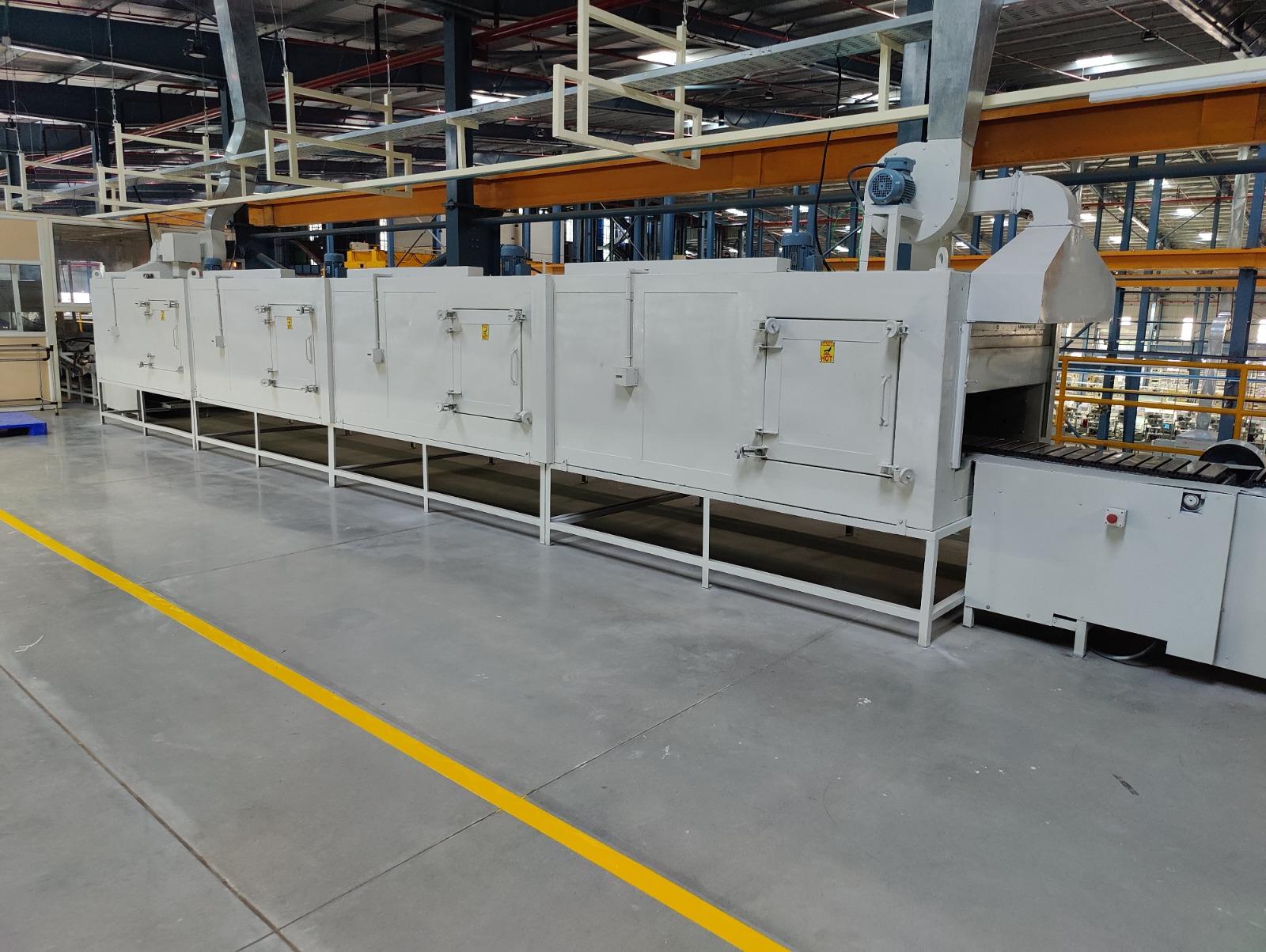Conveyor ovens are highly useful in manufacturing industries for a variety of applications. Here are some ways in which conveyor ovens benefit manufacturing processes:
Curing and Drying: Conveyor ovens are widely used for curing and drying processes in industries such as automotive, aerospace, electronics, and coatings. They provide a controlled and consistent environment for curing coatings, adhesives, and other materials. The conveyor system allows for continuous processing of products, ensuring efficient and uniform curing or drying throughout the production line.
Heat Treatment: Conveyor ovens are employed for heat treatment processes like annealing, tempering, and stress relieving of metal components. These processes help enhance the mechanical properties of the materials, improve their strength, hardness, and durability. Conveyor ovens provide precise temperature control and uniform heating, ensuring that the heat treatment is carried out accurately and consistently.
Preheating and Pre-treatment: Manufacturing processes often require preheating or pre-treatment of components before further processing. Conveyor ovens can be used to uniformly heat parts or apply specific treatments such as cleaning, degreasing, or coating. By incorporating a conveyor system, manufacturers can streamline the preheating or pre-treatment stage, reducing manual labor and ensuring consistent results.
Drying and Curing of Composite Materials: Conveyor ovens are crucial in industries working with composite materials, such as aerospace and marine manufacturing. These materials often require precise drying and curing to achieve their desired properties. Conveyor ovens provide controlled heat and airflow, ensuring uniform drying and curing of composite structures, including carbon fiber, fiberglass, and resins.
Sterilization: In industries like medical device manufacturing and pharmaceuticals, conveyor ovens are utilized for sterilization processes. They provide a controlled, high-temperature environment necessary for killing bacteria, viruses, and other microorganisms. Conveyor ovens with appropriate sterilization protocols ensure the safety and sterility of products, such as medical instruments, packaging, and pharmaceutical goods.
Testing and Quality Control: Conveyor ovens can be used for testing and quality control purposes in manufacturing industries. They allow for accelerated aging, life cycle testing, or environmental testing of products under controlled conditions. This helps manufacturers assess product performance, durability, and reliability before they are released to the market.
Overall, conveyor ovens contribute to the efficiency, consistency, and quality of manufacturing processes. They enable continuous production, precise temperature control, and uniform processing, thereby enhancing productivity and ensuring product integrity in various manufacturing applications.
Key advantages of conveyor ovens
Conveyor ovens offer several advantages in the manufacturing industry, making them a valuable asset for various processes. Here are some key advantages of conveyor ovens:
Efficient and Continuous Processing: Conveyor ovens facilitate efficient and continuous processing of materials or products. The conveyor belt system allows for a steady flow of items through the oven, ensuring a consistent and uninterrupted production cycle. This helps to maximize throughput and productivity, reducing downtime and manual labor.
Uniform Heating and Temperature Control: Conveyor ovens provide uniform heating and temperature control throughout the oven chamber. This ensures consistent processing of materials, preventing variations in product quality or properties. Uniform heat distribution helps in achieving desired results such as curing, drying, or heat treatment without hot spots or cold zones.
Time and Energy Savings: Conveyor ovens can significantly reduce processing time compared to batch ovens. As the products move continuously through the oven, they are exposed to the desired temperature for the required duration, optimizing the processing time. Additionally, conveyor ovens are designed with energy-efficient features, such as insulation and precise temperature control, leading to energy savings over time.
Flexibility and Customization: Conveyor ovens offer flexibility and customization options to suit specific manufacturing needs. They can be designed and configured to accommodate various product sizes, shapes, and throughput requirements. Conveyor speed, temperature profiles, and other parameters can be adjusted to match specific processing requirements, ensuring optimal results.
Improved Product Quality: The uniform heating and precise temperature control provided by conveyor ovens contribute to improved product quality. Consistent processing helps to achieve uniformity in product characteristics, such as texture, color, hardness, or strength. This consistency enhances the overall quality and reliability of manufactured products.
Enhanced Process Control: Conveyor ovens provide better process control compared to traditional batch ovens. Temperature, conveyor speed, and other parameters can be monitored and adjusted in real-time, allowing manufacturers to maintain tight control over the processing conditions. This level of control helps in achieving desired outcomes, reducing rejects, and enhancing overall process efficiency.
Safety and Operator Convenience: Conveyor ovens are designed with safety features to protect operators and minimize the risk of accidents. They often include safety interlocks, automatic shut-off mechanisms, and proper insulation to prevent heat-related hazards. The continuous flow of products through the oven also minimizes the need for manual handling, improving operator convenience and reducing the risk of repetitive strain injuries. These advantages make conveyor ovens a valuable asset in the manufacturing industry, contributing to increased efficiency, productivity, product quality, and process control.

